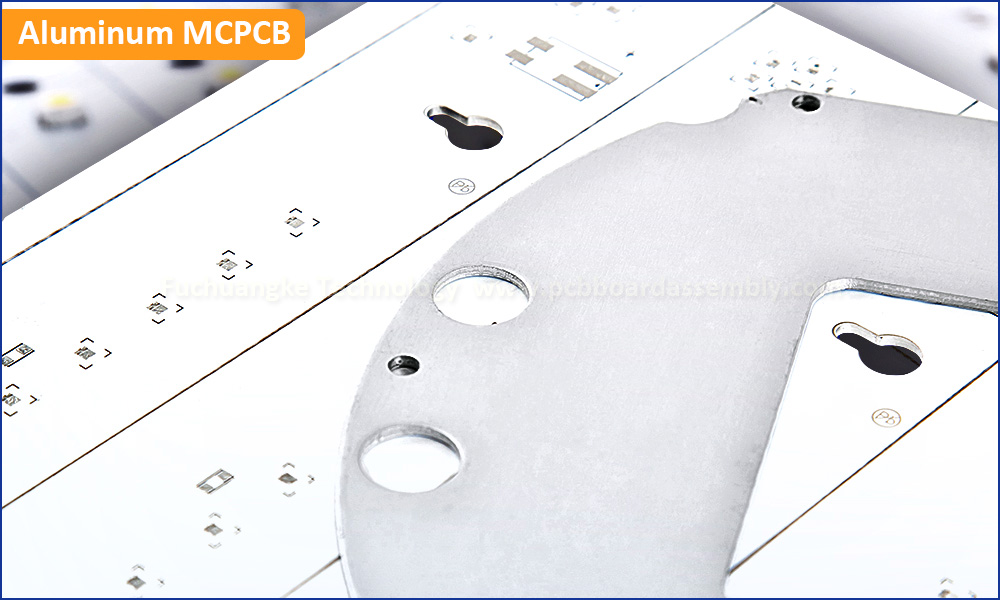Thermal Conductivity of Metal Core PCB
What’s MCPCB?

MCPCB, is the abbreviation of Metal Core Printed Circuit Board, also known as Metal Core PCB. MCPCB is made of metal-based copper-clad laminate but not CEM-3, FR-4 or polyimide-based materials, and is the segment that is growing rapidly nowadays in all kinds of application. The metal-based materials can be Aluminum-based and Copper-based. If you are in the industry of PCB fabrication, PCB design and electronic hardware development, you know the terms of aluminum printed circuit board, Alu PCB, Aluminum-based PCB, Alu-based PCB, Aluminum MCPCB, copper-based PCB and copper MCPCB, which are called metal core PCB.
The other term people not familiar with is IMS PCB, which is Insulated Metal Substrate PCB. Why called IMS PCB? That’s because there is a dielectric material between the copper layer(s) and the base metal. By PCB layer count, MCPCBs have single-sided, double-sided and multilayered, but single-sided Aluminum PCB is the most used layer. We are proud to be a professional Meatal Core PCB Manufacturer, and turnkey PCB and assembly provider with our own facilities.
Click to check our Metal Core PCB Manufacturing Capabilities.

Why Use Metal Core PCB?
Metal, like Aluminum and Copper, has much better thermal conductivity than that of FR4 and other non-conductive PCB base materials. Generally, the thermal conductivity of FR4 is around 0.25W/m·K, but the thermal conductivity of Aluminum Based PCB material is minimum 1W/m·K, the thermal conductivity of Copper Based PCB material is minimum 3W/m·K. With high thermal conductivity, the metal core circuit board will dissipate the heat generated by hose electronic components quicker and ensures the product lifespan. This feature has good application in many industries, including LED lighting, Power Conversion, PDP and Regulator for TV, Monitor Drivers, Rectifier, Power Supply and others.
MCPCB Thermal Management
In LED applications, especially high-power LED lights, it’s known that LED SMD converts the greater part of the current into heat rather than light itself. The PCB size is designed towards miniaturization, and the heat output per unit area increased in this situation. That’s to say, more and more heat is transferred to a smaller and smaller surface with or without PTH. Too much heat can’t be dissipated, the parts on the PCB assembly have to work under high temperature environment. When work in a certain time, the parts are easier to be damaged, then the products lifespan will be shorter compared to those products with high thermal conductivity MCPCBs. The consideration of sufficient heat management seems very important in PCB design stage.
In this blog, we recommend some valid tips to improve thermal management on printed circuit boards.
- Design / construction of PCB
Try to separate high power and signal conductors, enlarge the tracks of heavy currents, add copper thickness and add more thermal vias. Compared with the PCB design without these considerations, your design can do thermal dissipation much more and quicker.
- Heavy Copper PCBs
Copper itself has good thermal conductivity. Heavy copper (2oz, 3oz, max 10oz) can improve the heat dissipation.
Check our Heavy Copper PCB to know more about the thermal simulation of heavy copper.
- Thermal Via Array
Thermal vias will be helpful to achieve a significant reduction in thermal resistance, and improve thermal dissipation.
- Aluminum based PCB
Aluminum PCB is used to dissipate heat quickly and effectively from components, the thermal conductivity ranges from 1W/m·K to 3 W/m·K.
- Copper based PCB
Copper PCB has higher thermal conductivity than Aluminum based PCB, ranges from 4W/m·K to 7W/m·K.
PCB and PCBA Quick Quote
Click the Quick Quote buttons below, you can turn to the different PCB quote pages. Just fill in the PCB specifications, upload Gerber files, BOM, Assembly Drawing and Pick-and-Place file, you will get quick quote of PCB board and PCB Assembly.
FR-4 PCB Quote Flexible PCB Quote Rigid-Flex PCB Quote IMS PCB Quote